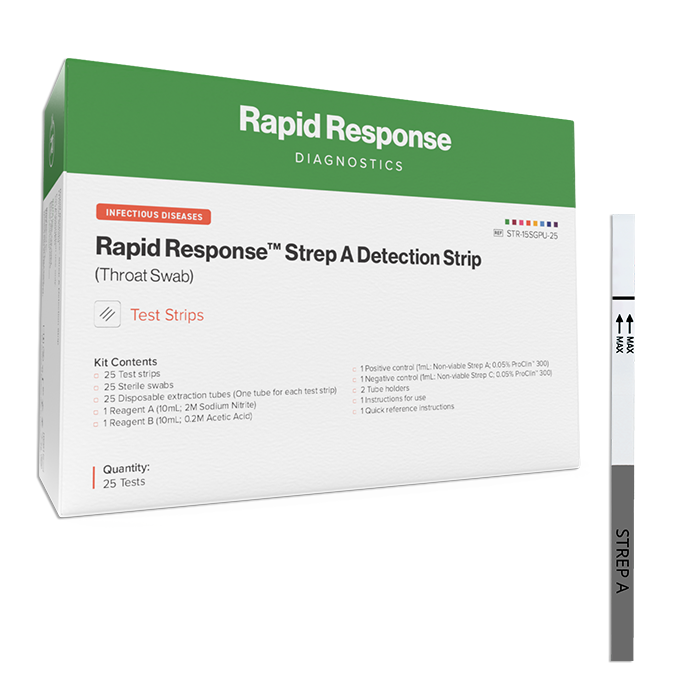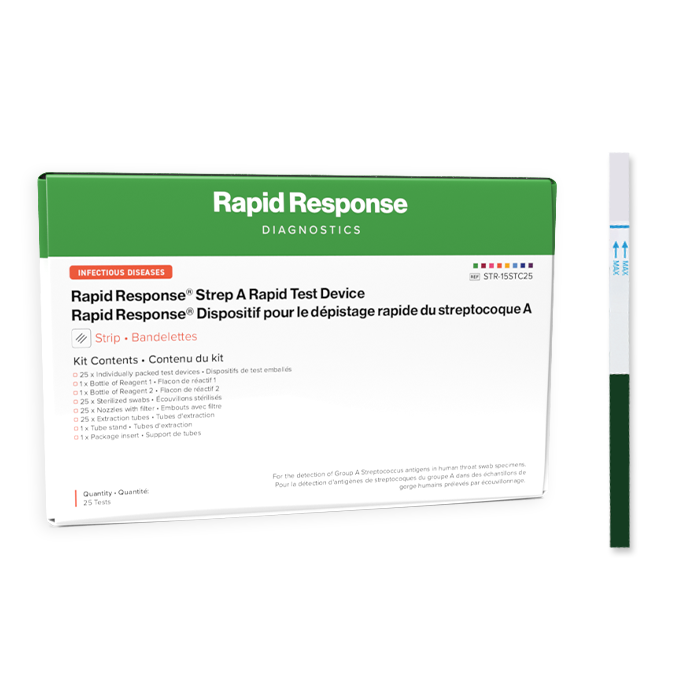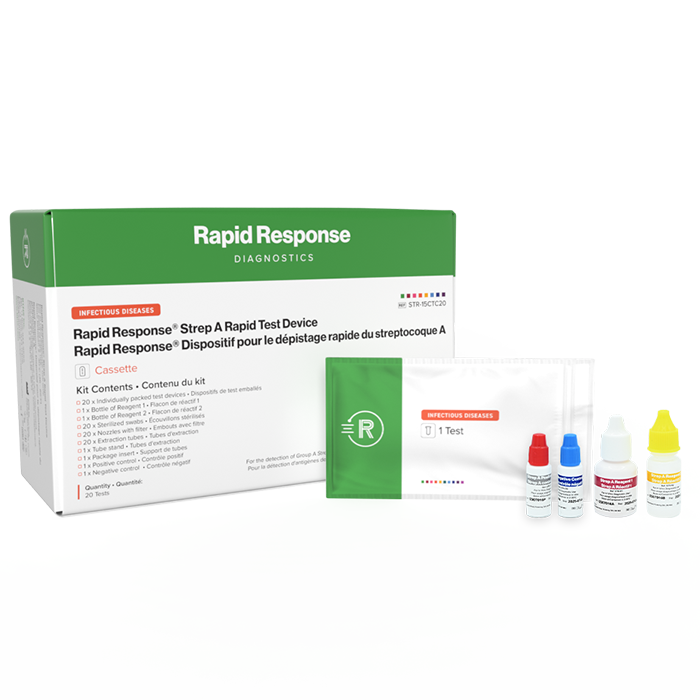Strep A

An infectious disease is an illness caused by specific contact with a pathogenic viruses, bacteria or parasites. Diagnostic tests are vital tools in understanding and controlling its spread. BTNX Inc. offers an array of infectious diseases test kits that are geared to aid healthcare professionals and at home users in efficiently and accurately diagnosing many infectious diseases including COVID-19, RSV, FLU A & B, H. pylori and more!
Introduction to Strep Tests
What is a Strep Test?
Strep tests are diagnostic tools to identify the presence of the Streptococcus bacterium. The two most common types of strep infections are Group A and Group B. Strep A Tests detect Streptococcus pyogenes (S pyogenes) antigens in the throat, which is a painful and contagious throat infection, known as strep throat. Strep B tests detect for the presence of Streptococcus agalactiae (S. agalactiae) antigens in the genital tract in women or newborns that invade the body and cause certain infections, known as GBS disease.
What is a Strep A Test?
The Rapid Response Strep A Test is a rapid test that detects Group A Streptococcus antigens in human throat swab specimens. These tests are intended to aid in the diagnosis of Strep A infection.
Streptococcal Infections
Strep, short for Streptococcus, is a type of bacteria. The two most common types of strep infections are Group A and Group B.
Group A Streptococcus (GAS):
- Alternate Names: Strep A, Streptococcus pyogenes, S. pyogenes
- Causes: Strep Throat, Scarlet Fever, Impetigo, Necrotizing Fasciitis, Cellulitis, Streptococcal Toxic Shock Syndrome, Rheumatic Fever, Post-Streptococcal Glomerulonephritis
What is Strep A
Beta-hemolytic Group A Streptococcus is a major cause of upper respiratory infections such as tonsillitis, pharyngitis, and scarlet fever. Early diagnosis and treatment of Group A Streptococcal pharyngitis has been shown to reduce the severity of symptoms and further complications, such as rheumatic fever and glomerulonephritis.
How is a Strep A test performed?
Strep A rapid tests work by detecting antigens of the Streptococcus pyogenes bacterium. A Strep A test is performed by swabbing the back of the throat. With a rapid antigen test, the swab specimen is extracted in a solution, which is then added to a testing device, usually a cassette. The sample from the throat swab interacts with antibodies on the test strip. If an infection is present, colored test lines will appear on the test membrane.
How does the Strep A Test work?
Anti-Strep A antibodies are immobilized on the test region of the membrane. During the test, the specimen reacts with polyclonal anti-Strep A antibodies conjugated to colored particles and precoated onto the sample pad of the test. The mixture then migrates through the membrane by capillary action and interacts with reagents on the membrane. If there is sufficient Strep A antigen in the specimen, a colored band will form at the test region of the membrane. The presence of this colored band indicates a positive result, while its absence indicates a negative result.
Strep Throat
What is Strep Throat
Strep throat is an infection in the throat and tonsils caused by the bacteria Group A Streptococcus (Group A Strep). Symptoms include pain when swallowing, fever, sore throat, and swollen lymph nodes.
How is it spread
Group A strep bacteria is very contagious. It can be spread to others through respiratory droplets and direct contact with the bacteria. The bacteria often live in the nose and throat. When people who are infected spread the bacteria by talking, coughing, or sneezing, respiratory droplets that contain the bacteria are spread. Touching something with those droplets and then touching their mouth or nose can also cause a person to get sick. Infected sores on a person;s skin can spread Group A strep bacteria when a person comes in contact and touches the fluid from the sores.
How is Strep Throat treated
A simple rapid test can give you fast results. A healthcare professional will use a rapid strep test to swab your throat to test for strep throat. Strep throat can be treated with antibiotics. When strep throat is not diagnosed or treated, complications may occur if the bacteria spreads to other parts of the body.
Source: National Center for Immunization and Respiratory Diseases, Division of Bacterial Diseases
Rapid Response Tests Comparison
| Product | Details | Test Method |
|
Rapid Response Strep A Rapid Test Device (SKU: STR-15STC25) |
Format: Strip Detects Strep A antigens Sample: Throat swab Time to results: 5 minutes |
An extraction tube is placed in a tube stand. Reagents are added into the tube. The swab with the collected specimen is immersed into the extraction tube. A nozzle is then placed onto the extraction tube. Drops of the extracted solution is added onto the sample region on the test strip. |
|
Rapid Response Strep A Rapid Test Device (SKU: STR-15CT20, STR-15CTC20) |
Format: Cassette Detects Strep A antigens Sample: Throat swab Time to results: 5 minutes |
An extraction tube is placed in a tube stand. Reagents are added into the tube. The swab with the collected specimen is immersed into the extraction tube. A nozzle is then placed onto the extraction tube. Drops of the extracted solution is added onto the sample region on the test cassette. |
Taking a Strep A Test
Where are they used?
Rapid strep test kits are utilized in healthcare settings.
How to get the test?
Visit your healthcare provider if you suspect you have strep throat. They will decide if a strep test is necessary based on symptoms and physical examination.
Can you take the test at home?
Rapid Response Strep A Rapid Tests are intended for professional point-of-care use only.
What can strep tests detect?
Strep tests detect the presence of a strep infection.
How to take the test
Please read the product insert included with your kit for more detailed instructions.
During: Swab the throat using the sterile swab provided with your kit. The collected throat specimen is then introduced to the testing device as per the test’s instructions.
After: Wait for the indicated amount of time for the test to process.
About the results
Positive Result: Indicates the presence of a strep infection.
Negative Result: Indicates no detectable bacteria, although it doesn’t necessarily rule out a strep infection. Further lab tests might be necessary.
Interpreting Results
Two coloured lines indicate a positive result. One line in the control region (C) and another band appears in the test region (T).
One coloured line in the control region (C) indicates a negative result. No coloured line appears in the test region (T).
If the control band fails to appear, the test is invalid. Results from any test which has not produced a control band at the specified read time must be discarded. Please review the procedure and repeat with a new test.
Prevention
For GAS, good hygiene practices such as frequent handwashing and not sharing personal items can reduce spreading the infection.
For GBS, several recent studies have shown that the intrapartum treatment of GBS-colonized women significantly reduces the incidence of GBS-caused sepsis.2-4 The US Center for Disease Control and Prevention (CDC) recommends routine examination for Group B streptococcus between the 35th and the 37th week of pregnancy. A CDC study has shown that routine examinations are 50% more effective than the use of antibiotics for pregnant women with clinical risk factors. Standard culture methods require 24 to 48 hours and the results may not be available soon enough for efficient treatment. Thus, methods utilizing more rapid screening techniques are required.
Find the best solution for your needs
Our sales representatives can help set you up for success! Contact our team today!
A rapid Strep A test for at-home use can be purchased over the counter. A positive test result should be followed up with a healthcare provider for confirmation and treatment.
Rapid strep tests are antigen tests that are used to detect group A strep proteins (antigens). Results are available in just 5 minutes providing healthcare professionals with the information they need for treatment.
Conventional methods for detecting Strep A infection are dependent on isolation and subsequent identification of the organism, and often require 24-48 hours.
Rapid Response Strep Tests can provide results in 5 minutes.
If your test results are positive, consult a healthcare provider for follow up care and treatment.
While over-the-counter treatments can help alleviate symptoms, they do not treat the underlying infection. You should speak to a healthcare provider for proper treatment.
After receiving treatment and antibiotics, your healthcare provider may use a follow-up strep A test to ensure that the infection has been cleared.
Yes, strep throat is highly contagious and can spread through respiratory droplets when a person coughs or sneezes.
Yes, the infected person may be asymptomatic and may not show signs that they are sick. However, they can still spread the germ.
The Rapid Response Strep Tests have an accuracy of over 97%. The accuracy of the test depends on the quality of the swab specimen. False negatives may result from improper specimen collection or storage. A negative result may also be obtained from patients at the onset of the disease due to low antigen concentration.
The test does not differentiate asymptomatic carriers of Group A Streptococcus from those with symptomatic infection. If clinical signs and symptoms are not consistent with laboratory test results, a follow-up throat culture is recommended.
Respiratory infections, including pharyngitis, can be caused by streptococci from serogroups other than Group A, as well as other pathogens.
As with all diagnostic tests, a definitive clinical diagnosis should not be based on the results of a single test, but should only be made by the physician after all clinical and laboratory findings have been evaluated.
People with strep throat should stay away from work, school, or public gatherings until they no longer have a fever, or have taken antibiotics for at least 12 to 48 hours. Ask your doctor if you have any concerns.
Strep is common in children but adults can also be infected by the bacteria when in close contact with children. Your healthcare provider may test all members who have sore throats.
Avoid getting strep throat by washing your hands thoroughly and often. Avoid sharing drinks or utensils and if you have a sore throat, cover your mouth when coughing and sneezing.
If you experience symptoms of painful swallowing, throat pain (pharyngitis) / sore throat, red and swollen tonsils, tiny red spots (petechiae) on the back of the roof of the mouth, swollen lymph nodes in the front of your neck, fever, headache, red rash on the body (scarlet fever), gastrointestinal symptoms such as stomach pain, nausea or vomiting (more common in children), or body aches.
Rapid Strep A tests are interpreted in a similar manner as COVID-19 tests. The Rapid Response Strep A Rapid Test Device results interpretation are as follows:
Read results 5 minutes after the sample has been applied to the specimen region of the strip:
Positive Results (Strep A Antigens Detected): Two coloured bands appear on the membrane. One band appears in the control region (C) and another band appears in the test region (T).
Negative Result (Strep A Antigens Not Detected): Only one coloured band appears, in the control region (C). No apparent coloured band appears in the test region (T).
Invalid Result: Control band fails to appear. Results from any test which has not produced a control band at the specified read time must be discarded. Please review the procedure and repeat with a new test.
These instructions are for illustrative purposes only. Please refer to the full instructions provided with your test kit before interpreting results.




 Canada
Canada